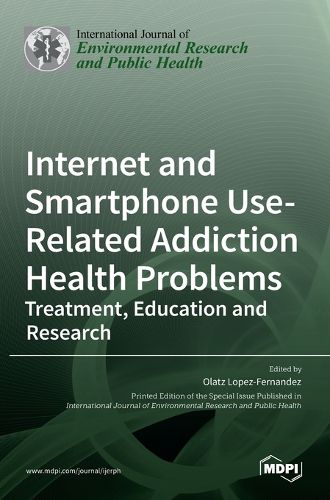Readings Newsletter
Become a Readings Member to make your shopping experience even easier.
Sign in or sign up for free!
You’re not far away from qualifying for FREE standard shipping within Australia
You’ve qualified for FREE standard shipping within Australia
The cart is loading…






This title is printed to order. This book may have been self-published. If so, we cannot guarantee the quality of the content. In the main most books will have gone through the editing process however some may not. We therefore suggest that you be aware of this before ordering this book. If in doubt check either the author or publisher’s details as we are unable to accept any returns unless they are faulty. Please contact us if you have any questions.
This Special Issue presents some of the main emerging research on technological topics of health and education approaches to Internet use-related problems, before and during the beginning of coronavirus disease 2019 (COVID-19). The objective is to provide an overview to facilitate a comprehensive and practical approach to these new trends to promote research, interventions, education, and prevention. It contains 40 papers, four reviews and thirty-five empirical papers and an editorial introducing everything in a rapid review format. Overall, the empirical ones are of a relational type, associating specific behavioral addictive problems with individual factors, and a few with contextual factors, generally in adult populations. Many have adapted scales to measure these problems, and a few cover experiments and mixed methods studies. The reviews tend to be about the concepts and measures of these problems, intervention options, and prevention. In summary, it seems that these are a global culture trend impacting health and educational domains. Internet use-related addiction problems have emerged in almost all societies, and strategies to cope with them are under development to offer solutions to these contemporary challenges, especially during the pandemic situation that has highlighted the global health problems that we have, and how to holistically tackle them.
$9.00 standard shipping within Australia
FREE standard shipping within Australia for orders over $100.00
Express & International shipping calculated at checkout
This title is printed to order. This book may have been self-published. If so, we cannot guarantee the quality of the content. In the main most books will have gone through the editing process however some may not. We therefore suggest that you be aware of this before ordering this book. If in doubt check either the author or publisher’s details as we are unable to accept any returns unless they are faulty. Please contact us if you have any questions.
This Special Issue presents some of the main emerging research on technological topics of health and education approaches to Internet use-related problems, before and during the beginning of coronavirus disease 2019 (COVID-19). The objective is to provide an overview to facilitate a comprehensive and practical approach to these new trends to promote research, interventions, education, and prevention. It contains 40 papers, four reviews and thirty-five empirical papers and an editorial introducing everything in a rapid review format. Overall, the empirical ones are of a relational type, associating specific behavioral addictive problems with individual factors, and a few with contextual factors, generally in adult populations. Many have adapted scales to measure these problems, and a few cover experiments and mixed methods studies. The reviews tend to be about the concepts and measures of these problems, intervention options, and prevention. In summary, it seems that these are a global culture trend impacting health and educational domains. Internet use-related addiction problems have emerged in almost all societies, and strategies to cope with them are under development to offer solutions to these contemporary challenges, especially during the pandemic situation that has highlighted the global health problems that we have, and how to holistically tackle them.